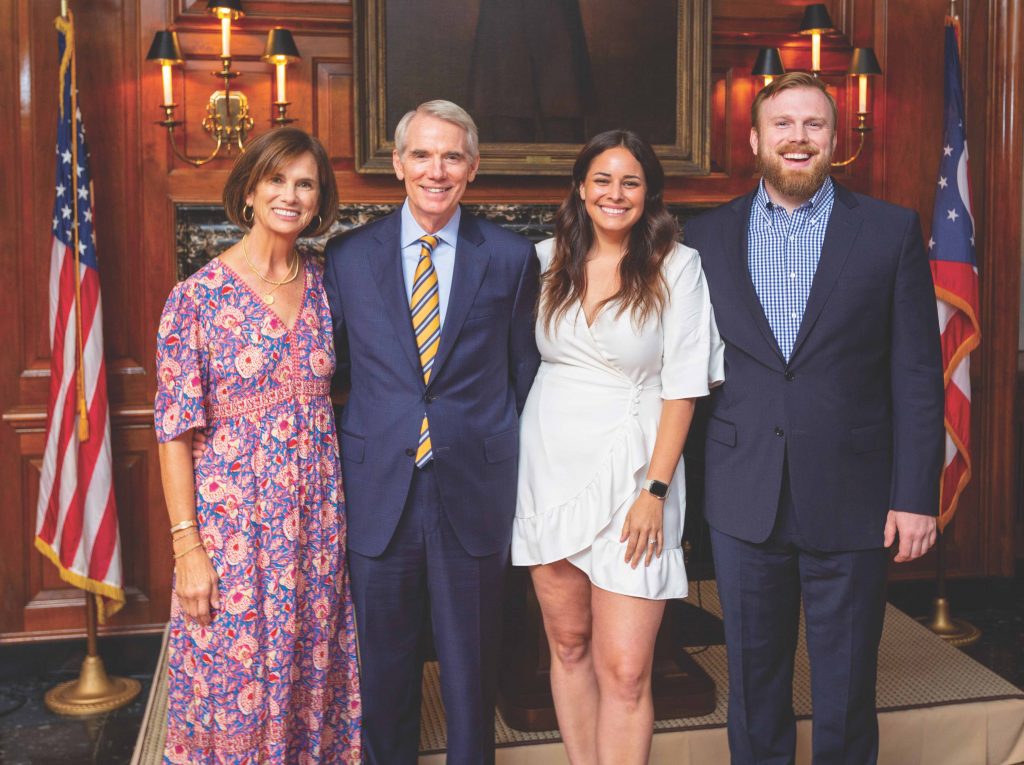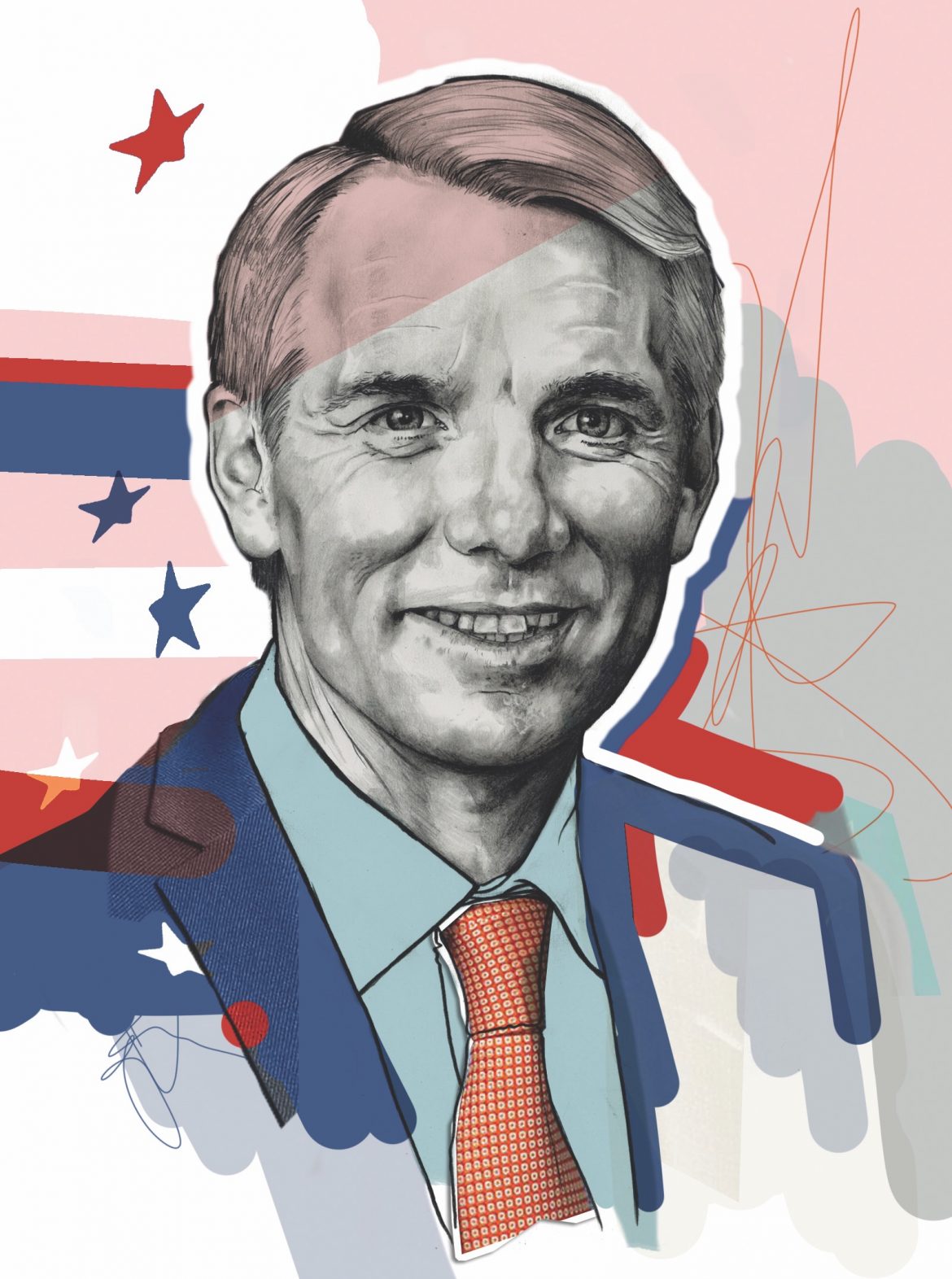After a career in public service of more than 30 years, Ohio Sen. Rob Portman announced in early 2021 that he wouldn’t run for a third term in the Senate this year and will retire. In addition to his 12 years in the Senate, the Republican also represented Cincinnati in the U.S. House of Representatives and served in the White House under two presidents.
He began his career in government in 1989 as an associate White House counsel under President George H.W. Bush, for whom he’d campaigned. In 2005, President George W. Bush nominated him for the post of U.S. trade representative, where he served until 2006, when Bush nominated him to be director of the Office of Management and Budget, a huge federal agency that produces the president’s budget and oversees the performance of other federal agencies. The Senate unanimously confirmed his nomination.
In 2010, Portman ran for and won a U.S. Senate seat after George Voinovich announced he wouldn’t run for re-election. He was re-elected in 2016, beating former Ohio Gov. Ted Strickland. Over those years, Portman amassed a substantial legislative record and built a reputation for bipartisanship. He’s a fiscal conservative whose respectful and gentlemanly demeanor allowed him to work with Democratic senators such as his Ohio colleague Sherrod Brown and others to craft bills that would get enough votes from both parties to be enacted into law.
In a letter announcing his planned retirement from public office, Portman wrote, “I am really looking forward to being home in Ohio full time, seeing family and friends more, and getting back to the private sector, including being able to be more involved in the community and in our family business. And I plan to stay involved in public policy issues.” He also wrote of the political environment in Washington: “Honestly, it has gotten harder and harder to break through the partisan gridlock and make progress on substantive policy, and that has contributed to my decision. This is a tough time to be in public service.”
We spoke to him in a wide-ranging interview just after he returned from an official trip to Ukraine that he made with Sen. Amy Klobuchar, a Democrat from Minnesota. That followed a downtown reception at which the Cincinnati USA Regional Chamber honored him with the first Rob Portman Public Service Leadership Award, which the organization will present to a deserving local business leader. We discussed his career, its beginnings, politics today, and what’s next after his decades in Washington, D.C.

YOU’VE HAD A LONG AND PRODUCTIVE LEGISLATIVE CAREER, BUT ARE THERE TWO OR THREE ACCOMPLISHMENTS THAT REALLY STAND OUT FOR YOU?
I approach the job a little differently than some. I believe my responsibility is that I’ve been hired to get things done, and to get things done in Washington you have to be willing to work across the aisle. You need 60 votes in the Senate, so you have to find colleagues on the other side of the aisle and you have to work together.
I think we either authored or co-authored 187 bills in the Senate that became law. I hate to pick favorites, but I’ll mention three. One is the infrastructure legislation because it’s so significant to Cincinnati and because it’s so recent. It will be the largest investment in our country’s infrastructure since President Eisenhower’s interstate highway system. It’s a pretty broad definition of infrastructure, including broadband and digital infrastructure, and it also includes basics like the Brent Spence Bridge. It’s going to make a big difference in people’s lives, and it’s going to make a big difference to our economy and to people’s lifestyles. It will help our country, too, because about 3 percent of the country’s GDP travels across that bridge.
Another would be what we’ve done on the substance abuse front. There are about five different pieces of legislation, but I’d summarize it in two ways. One is changing the approach that focused almost exclusively on interdiction and law enforcement and the supply side to focusing on treatment and recovery and prevention on the demand side. I think that’s been a shift. I’ve been really proud to be part of that because it’s going to be more effective. Unfortunately, since the pandemic we’ve seen an increase in overdose deaths, but prior to that we were making real progress in reducing overdose deaths.
We’ve also worked to ensure that people understand that addiction is a disease and that just by locking people up you’re not going to solve the problem. Those who are addicted will come out of the prison system with the same addiction they went in with. So we need to focus on treating it like a disease, which means treatment and long-term recovery. We need to refocus on the drug issue, which has been kind of hiding behind the pandemic.
And we’re in the process of trying to pass legislation right now on retirement savings. I’ve passed three bills on this topic that have significantly expanded the number of people who are able to save with 401Ks and IRAs and enabled more people to have peace of mind in retirement. We’re at the crux right now of a fourth bill that would be really significant to help part-time workers, lower-income workers, and small businesses. The whole notion is to give every American the opportunity to save for retirement and to supplement Social Security.
YOU HAD A KEY ROLE IN GATHERING ENOUGH REPUBLICANS TO GET THE INFRASTRUCTURE BILL PASSED. HOW DID THAT PLAY OUT?
I was the lead Republican negotiator. It started with just two people, Sen. Kyrsten Sinema, the Democrat from Arizona, and myself. Then we expanded it to five Republicans and five Democrats, and then 10 Democrats and 10 Republicans. And we got two-thirds, almost three-quarters, of the Senate on board. It was a matter of working with colleagues on both sides of the aisle, not from the top down but from the center out.
HOW WERE YOU ABLE TO GET THAT DONE?
After he was elected, President Biden proposed an infrastructure package that was about $2.6 trillion and included the biggest tax increase in history. It also included a number of items that had nothing to do with infrastructure. Senator Sinema and I looked at that and, instead of seeing another partisan bill that would go nowhere—which happened in the Trump years, the Bush years, and the Obama years—we saw an opportunity to make lemonade out of lemons. That meant getting rid of the tax increases and narrowing down the cost of the bill to real infrastructure.
We had different opinions on every item, so the negotiation just wasn’t with Democrats in the Senate or in the House, it was also with the White House. It was sort of a three-way negotiation, which is one reason why it took six months to get done. I was in Washington for more weekends than I’d ever been. It was nonstop negotiations for months, really.

HOW HAS WASHINGTON AND GOVERNING AND POLICYMAKING CHANGED IN YOUR 30 YEARS THERE?
It’s become harder to do the kinds of things I’d like to do. I was wondering whether another six years made sense for me. But I’ve also been doing it for 30 years, and I thought it was time to give someone else a chance. But I want to make it clear that even though it’s harder, it isn’t impossible. I’ve just given some examples of that, but there are dozens of others where we’ve been able to figure out a way forward on a bipartisan basis by engaging with Democrats early in the process and showing respect for one another. So it’s not impossible. I think it’s a mistake to give, particularly to younger Americans, the sense that the system is totally broken.
YOU’VE HAD A REPUTATION FOR PROMOTING BIPARTISANSHIP. HOW CAN THAT SPIRIT BE RESTORED TO THE SENATE?
I feel that most people believe the job of public servants is to figure out how to get things done, and you have to work with both sides of the aisle to do that. I think that’s part of how we recreate the magic of our democracy that the founders intended. Go straight to the people and say, This polarization and division is not in our interest. And encourage people to hold up examples of solutions and outcomes.
WHAT NEEDS TO BE DONE?
Social media moves people in the other direction, and I think partisan districts, where your primary is all you really care about, also work against bipartisanship. People are telling us that they actually want us to get stuff done. I think people have to realize that lurching back and forth with partisan solutions is not success. There’s a messaging opportunity there to try to let people know that there’s a better way.
ARE THERE STEPS THAT CONGRESS ITSELF COULD TAKE?
I think we need some tweaks in terms of the rules in the Senate and the House. And our election system needs some reform of so-called gerrymandering to create more incentives for people to see the job as one where you’re hired to get something done and to focus on solutions. One thing I say to my staff is that we’re here to make a difference, not just to make a point.
TELL ME ABOUT BEING CALLED TO PUBLIC SERVICE IN THE FIRST PLACE. HOW AND WHY DID THAT OCCUR TO YOU?
My mom and dad both thought I was a little crazy. My dad thought I was doubly crazy because I went into law rather than business. Most small-business people don’t have a lot of love for lawyers. But I started to represent his company and other small businesses, and I think he saw value in that.
I was fortunate to have a role model early on, George H.W. Bush. I started working on his presidential campaign when he first ran. I liked his style, and he hired me when he ran for president himself. I was with him in 1980 and also in 1988. He gave me the opportunity to work full time in public service in his White House. So that was good to have someone as a role model who was doing it honorably.
But I really attribute my start in public service to my mother. She was very involved in the community and in so many good causes, so that inspired me. I remember driving with her in Cincinnati down a road that had potholes when I was 7 or 8 years old. And I said to her something she remembered to her last days, I said, Mom, someday I’m going to be in charge of fixing these potholes. (Pauses) I can’t believe I’m getting emotional about potholes…
The irony is I spent 30 years doing everything but fixing potholes. When you’re a senator or associate counsel to the president or OMB director, you don’t fix potholes. But we just did the infrastructure bill, so it took me 30 years to get back to the reason I told my mom I wanted to get into public service.
I NEED TO ASK YOU ABOUT PRESIDENT BIDEN’S SPEECH IN WHICH HE CALLED OUT MAGA REPUBLICANS AND DREW A DISTINCTION BETWEEN THEM AND TRADITIONAL REPUBLICANS. WHAT DOES THE RISE OF THIS WING OF THE PARTY MEAN FOR THE GOP GOING FORWARD?
I was really disappointed in the speech. I thought it was unnecessarily partisan. I don’t know that it’s good for our country right now to take a whole group of people and categorize them as somehow unpatriotic and wrong on everything, and even dangerous to our democracy. Obviously, what happened on January 6 was totally inappropriate, and I’ve spoken out against it. I was one of the first Republicans to say the election was over, and I voted for the independent commission (to investigate the January 6 attack).
But our Republican Party is undergoing some fissures right now. You’ve got the former president supporting candidates who say that the election was a fraud and not supporting others who say we should be looking forward. On the other hand, there’s a large group of us Republicans who believe in economic policies, inflation policies, energy policies, and border policies that make a lot more sense for Ohio voters and voters nationally. I think most people will agree with that agenda if we focus on it rather than focusing on the 2020 election.

YOU JUST GOT BACK FROM UKRAINE. WHAT’S YOUR ASSESSMENT OF THE SITUATION THERE AND PROSPECTS FOR AN END TO THE WAR?
It’s still very tough. Russia has repeatedly committed war crimes in an illegal, totally unjustified and brutal war against a strong ally of the United States, a free and independent country that happens to be a democracy. You’ve got a Russian army that is far bigger and has far more weapons against a much smaller and less well-equipped Ukrainian military trying to protect its homeland and freedom. The rest of the world has chosen to stay out in terms of providing troops, which I understand, given the context of Afghanistan and Iraq. But we have to remember that this is an attack on a sovereign country, much like when Kuwait was attacked by Iraq, where we did get involved militarily.
So I think the right approach is to provide Ukrainians with the ability to defend themselves. I will tell you that what we’ve provided has made a difference. It isn’t enough in my view, but enough to be able to actually make progress on the battlefield. I think the only way it will end is if Vladmir Putin is willing to come to the bargaining table in good faith. I don’t think that happens until the Ukrainians have success on the battlefield and the sanctions begin to bite. And both of those things are in progress.
I GET THE SENSE THAT YOU MAY NOT MISS THE CAMPAIGNING PART OF BEING IN PUBLIC OFFICE. HOW HAS THAT CHANGED OVER THE YEARS?
That’s right. It’s certainly gotten more expensive. When I first ran, if you raised $1 million for a House race, that was a huge amount. Now it’s commonplace. In the Senate, if you raised $5 million or $10 million, that was a big deal. Now in some states, if you don’t raise $50 million or $70 million, it’s not enough. I don’t like that part of the business. I never liked it.
I don’t know that I really like politics that much, to be honest. I’ve never lost a race, so I’ve been fortunate. I like the grassroots part. I do like meeting people and talking to people, I like getting to know our state because it’s so diverse and there are so many interesting people, institutions, and companies. But not having to fund-raise (for re-election) made it easier for me to focus on legislation this past year.
WHAT ARE YOU WORKING ON BETWEEN NOW AND THE END OF YOUR TERM?
One is the retirement security bill that I mentioned. One is a worker retraining bill called the JOBS Act that I’m really excited about. One is a new opioid bill. We’ve still got a lot going on. So it’s nice not to have to be fundraising. I want to run through the tape on these legislative initiatives.
YOU’VE ALSO WORKED INSIDE THE WHITE HOUSE. CAN YOU DESCRIBE THE DIFFERENCES BETWEEN WORKING IN THE ADMINISTRATION VERSUS WORKING ON CAPITOL HILL?
It’s all related because you’re in public service and trying to help accomplish things, but it’s different when you don’t have your own name on the ballot. You don’t have to sell yourself all the time like you do in politics, but if you work for someone you believe in, then it’s easier, in a way, to promote their policies and talk about them. It’s easier to talk about somebody else than talk about yourself.
The thing I liked about all the jobs in the executive branch, particularly the last two I had, the USTR and OMB, is you’re managing people, which is really fun. I manage a small group in my Senate office now, but at OMB in particular we were involved in oversight of all federal agencies and departments, so you’re really engaged in management.
WHAT’S NEXT FOR YOU?
I want to stay involved in public policy. Specifically, to be involved in encouraging people to view public service differently. It doesn’t have to be a zero-sum game. I believe in the promise of public service—that you can get things done for people. So I’ve talked to folks about that.
I want to encourage young people to get into public service and make a difference, and I want to get back involved in business. I love the private sector. There may be some opportunities to do that with the family business, but probably more broadly than that with the private sector. I also want to be of help on some specific issues from a nonprofit or charitable point of view. I’m the founder of an anti-drug group in Cincinnati called Prevention First, and I want to stay involved in that issue in any way that I can be helpful.
In some ways, it’s easier to help on the outside than to be on the inside.


